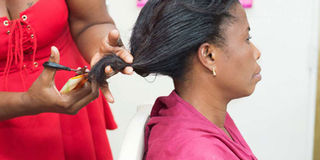Kenya beauty industry takes mighty beating in hands of coronavirus

With rent to pay against the backdrop of low business volume, some salon owners have been forced to fire workers. PHOTO | FOTOSEARCH
What you need to know:
- Beauty parlours and spas may have been the first ones to shut down when the crisis started, but smaller estate beauty shops have taken the worst beating.
- Men aren’t having it any easier. With most barber shops closed, men are having to improvise to perform haircuts at home.
If Mercy Mumbi had foreseen the coronavirus crisis, she wouldn’t have plaited her hair into dreadlocks. Tired of weekly visits to the salon, she had decided to wear locks. Three months down the line, she now says her decision was a fatal mistake.
The mother of three from Syokimau is anxious, confused and angry. Her situation, she says, is worse than a bad hair day.
‘‘I was caught up in a transition phase to dreadlocks,’’ she says. ‘‘The young locks are very sensitive and require weekly treatment. The longest you can go without tending them is two weeks. My hair is now in chaos,’’ she adds, pinching the short locks underneath her long black wig.
Ms Mumbi has now been forced to wear a wig ‘‘to cover the embarrassment’’. She says it would be worse if she had to go to work.
‘‘Is it going to be weeks or months? I might have to chop off the locks which will be a big loss,’’ she says, adding that seeing a stylist at home is expensive.
Ms Mumbi is only one of the thousands of Kenyan women dealing with bad hair days at this time. With many unable to make their usual visits to the salon, it’s high season for wigs.
From the authentic, pricey brands that go for as much as Sh200,000 to the cheap, ‘‘bulky as displayed’’ knock-offs that retail at Sh1,500, business is booming for wigs sellers.
‘‘Clearance sale for human hair weaves for only Sh1,000,’’ reads one advertisement posted on a Facebook page called Used Household Goods-Nairobi. Pushed to the brink of desperation to maintain their looks, women are finding themselves less and less choosier.
While it’s possible to conceal unruly hair with a wig, it’s different with nails. Every time Ms Esther Wahito looks at hers fingernails, she frowns.
All the vanish is gone and her nails are chipped. That she has been working from home hasn’t helped matters either. She hasn’t seen an acrylics specialist for a month now, the longest she has gone without tending them.
‘‘I can manage with ugly toenails, but these fingernails are giving me sleepless nights,” she laments.
Beauty parlours and spas may have been the first ones to shut down when the crisis started, but smaller estate beauty shops have taken the worst beating. Some of them remained open in spite of the declining business.
A spot check by the Nation in Roysambu, Clay City, Mwiki and Kayole revealed minimal activity. Ms Emily Kuria, a hairdresser, says her business has been losing Sh150,000 per week due to the low footfall. As such, she can’t pay her rent.
‘‘We’re now doing business purely on appointment. Some customers are inviting us to their homes. But because of the fear of infection, many people are avoiding all contact with outsiders,’’ Ms Kuria laments.
With rent to pay against the backdrop of low business volume, Ms Kuria has been forced to fire some of her workers. On average, Ms Mumbi spends Sh1,500 during her weekly visits to the salon.
In a month, she spends about Sh5,000 for her beauty needs. This amount translates to income lost for her stylist.
Men aren’t having it any easier. With most barber shops closed, men are having to improvise to perform haircuts at home.
On Twitter, the hashtag #quarantinehaircut has been trending around the world, with users sharing photos of their home haircuts, the majority if which are obvious bloopers.
Mr Moses Mwenja, a Nyeri-based accountant, hasn’t had a haircut for a month, which is unusual for him. Mwenja told the Nation that he was willing to have unkempt hair than to risk an infection.
‘‘I go for a haircut every week. But my barber attends to so many clients, which means a higher risk of infection. For that reason, I’ve avoided going to the barbershop,’’ Mr Mwenja said.





